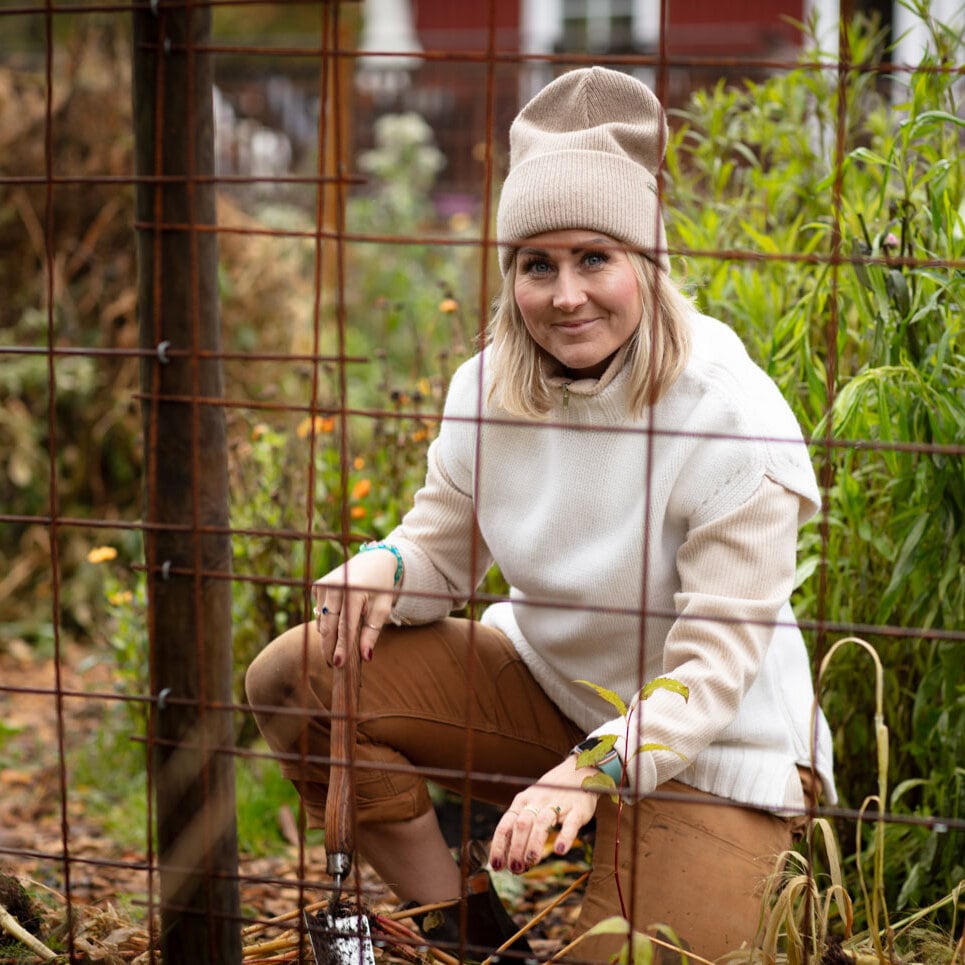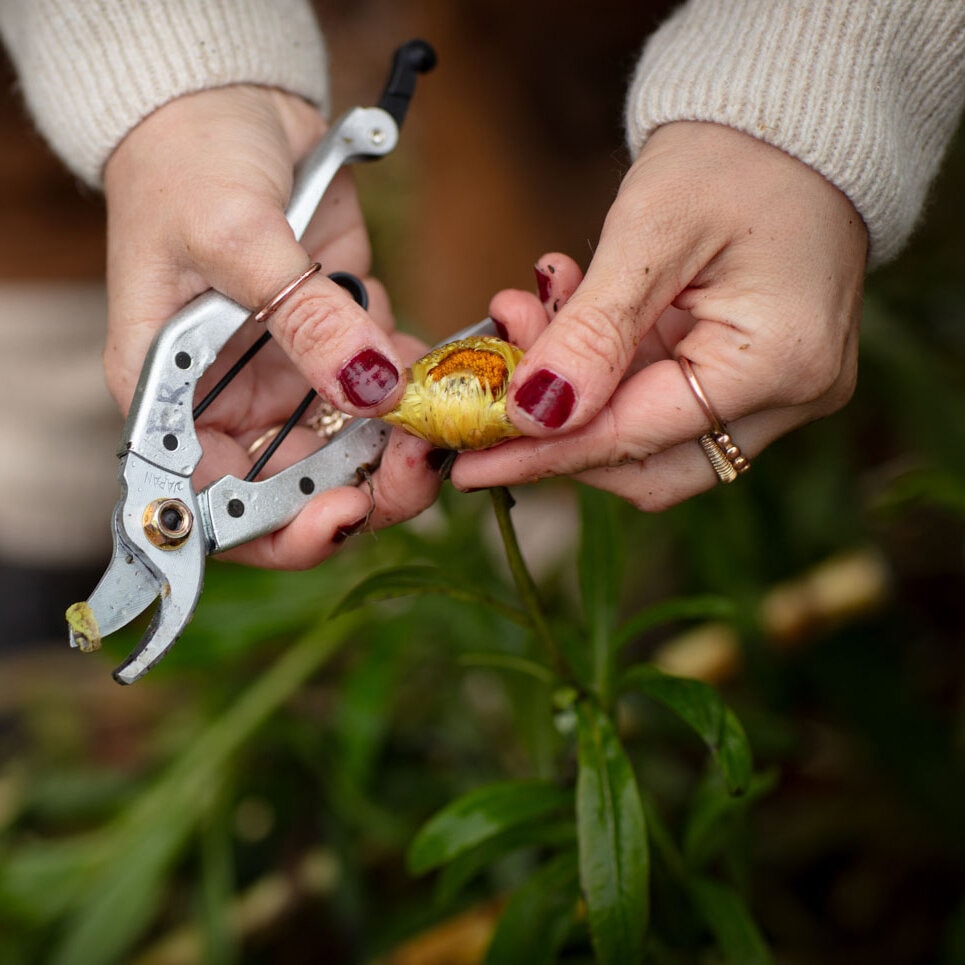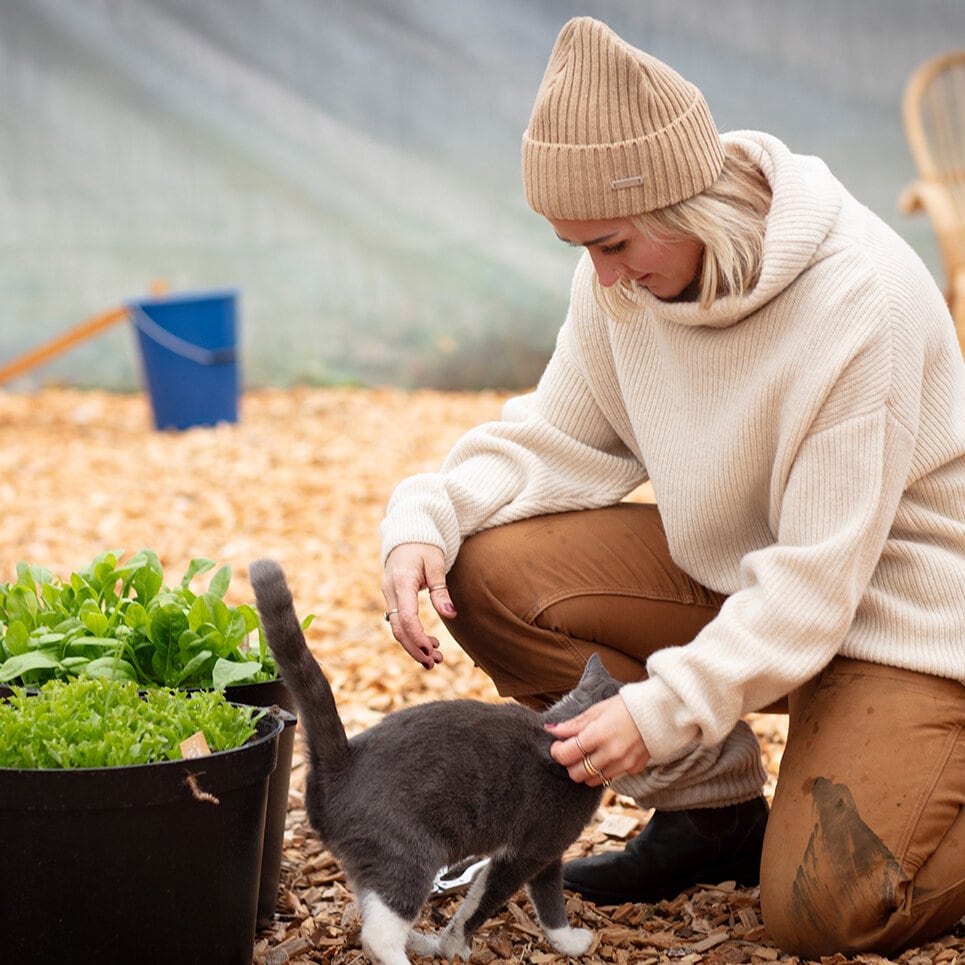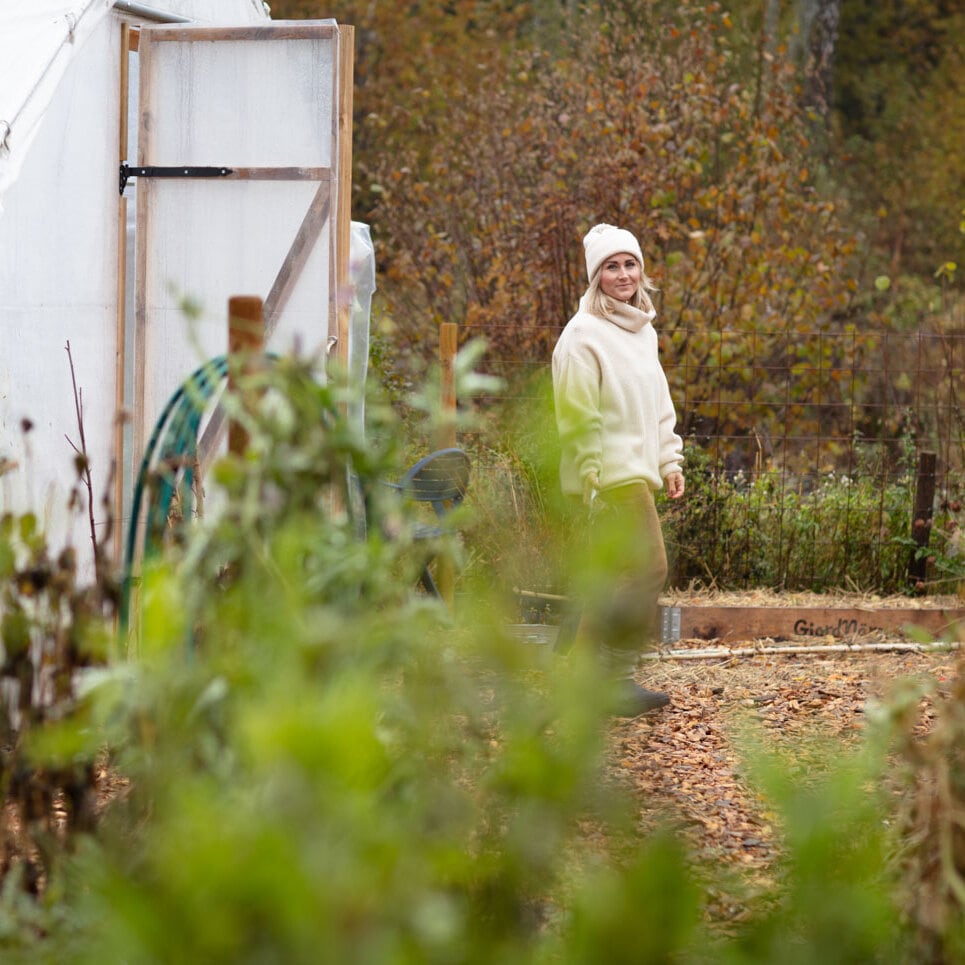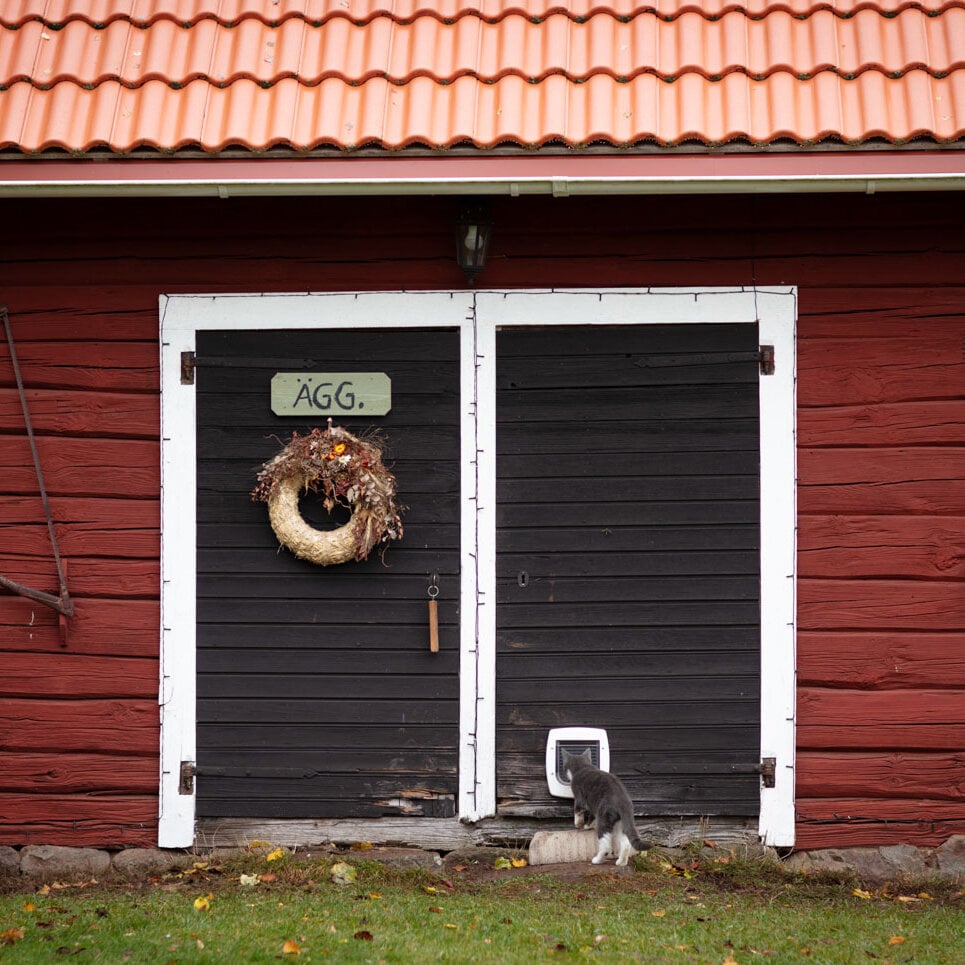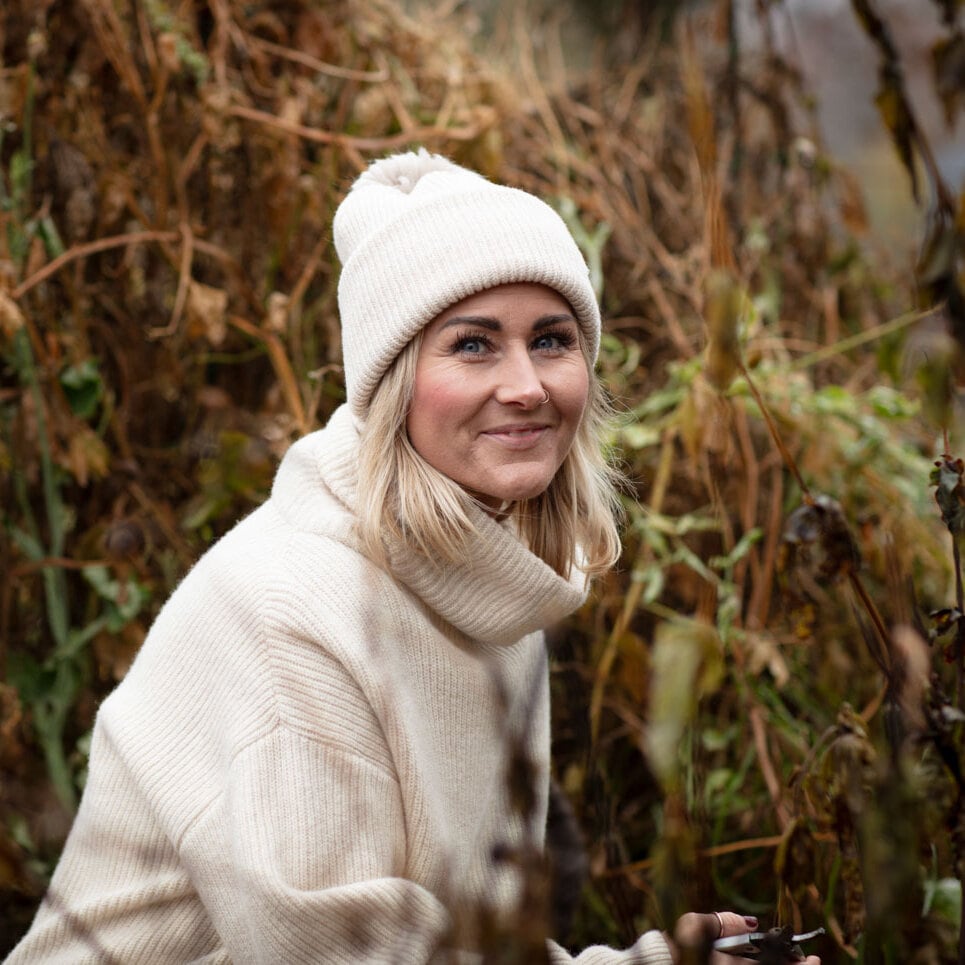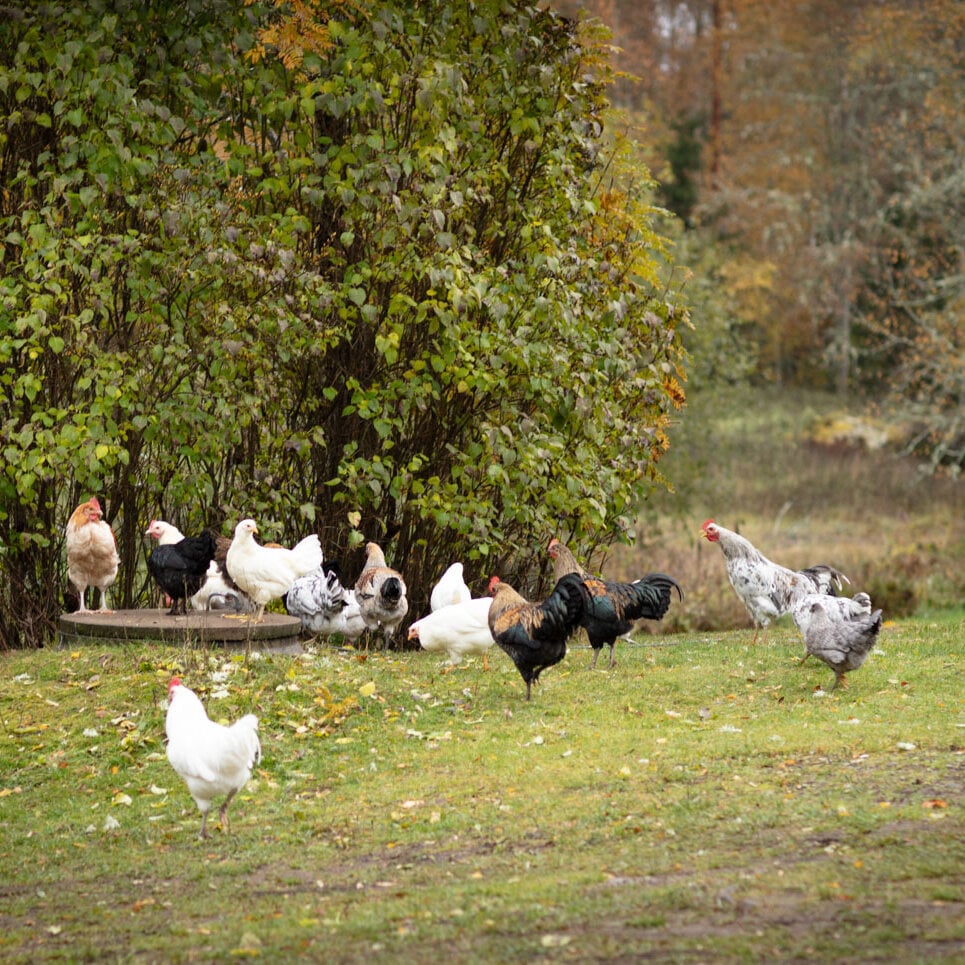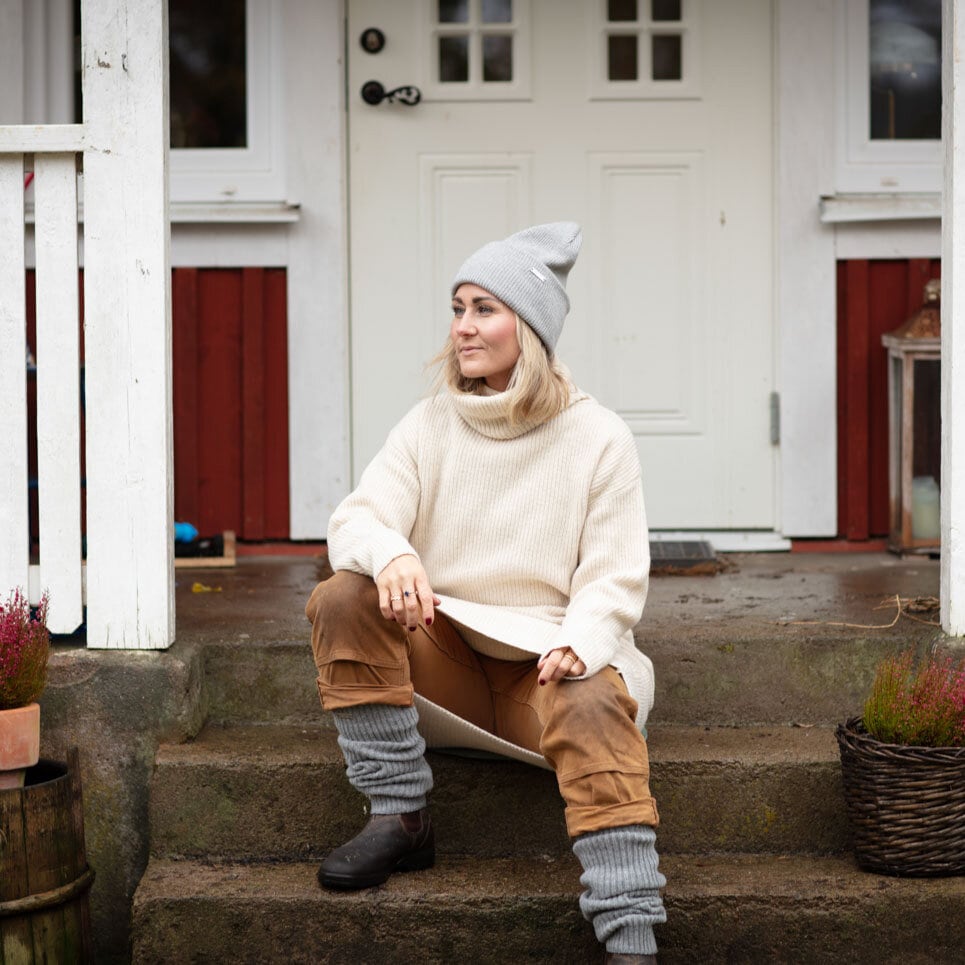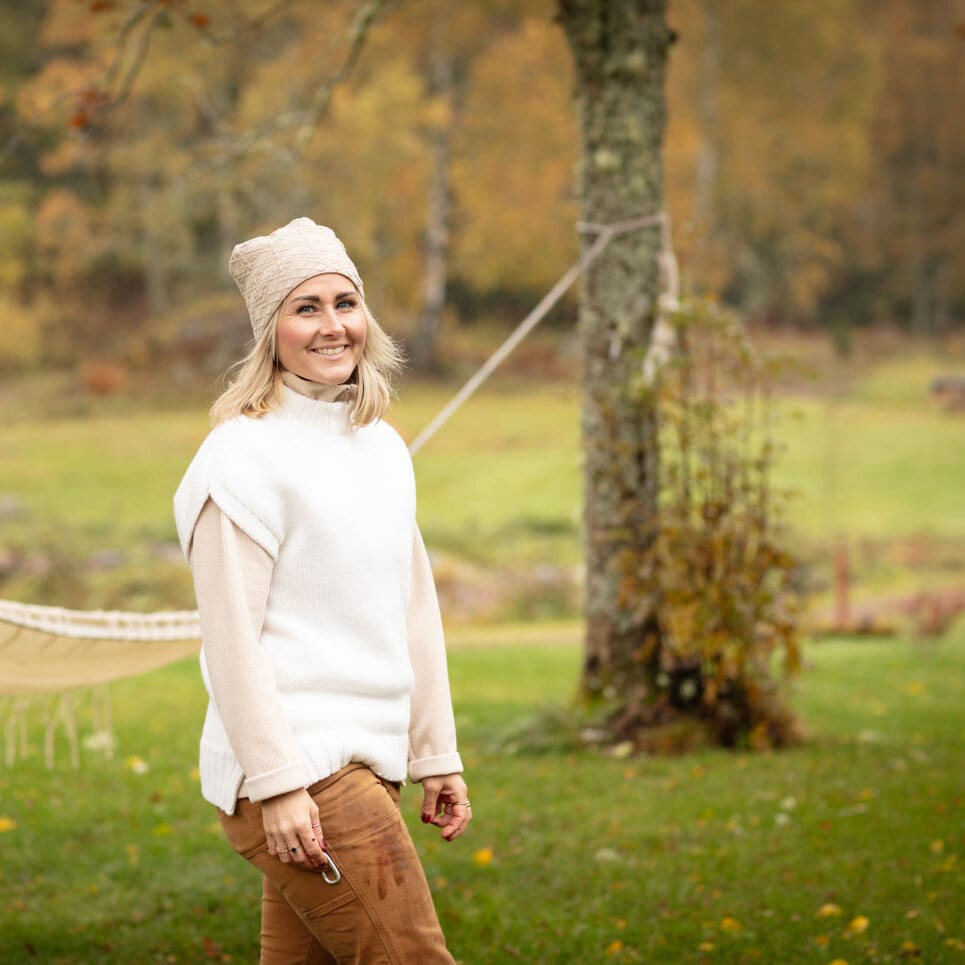- Home
- Hoito-ohjeet
- Sätila stories
Emma Svenberg - About how I decided to change my life
On a gray autumn day, where nature has been painted in shades of yellow, orange, and brown, we drive up to the courtyard of Emma Svenberg's small farm. Emma is an oncology specialist nurse who took the step into a future she knew nothing about. She lives just outside Trehörna in southwestern Östergötland with her partner, two daughters, a stepdaughter, three cats, and a whole lot of chickens and ducks.
And who is Emma? Why are we talking about her? Well, we believe that Emma has an interesting and courageous story to tell about daring to change her life and living more sustainably for both nature, body, and soul. So, who are you, Emma?
Well, who am I? It's a bit funny with a question like this because before I stopped being a nurse, the immediate answer was 'I am a nurse.' Now I'm not anymore, and I've come to the realization that I'm a very energetic person with many ideas, starting various projects that I don't always finish, says Emma, laughing. But I also love living like this, where I get the peace I need to handle all of the things I've signed up to do. I'm chairman of the village association, also involved in other associations, and I also want to have an eventful everyday life.
Your identity as a nurse, how has it been to let go of that?
It was a huge change, and I experienced a deep identity crisis. Being so deeply rooted in being identified with my profession, which also took up a big part of my life, but also because I was going through a divorce at the same time. You identify yourself as someone's wife, as someone's mother, and I also identified myself with my profession at the time. Then I was going to stop being someone's wife and just be a mother 'sometimes,' and it led to thoughts like 'who am I when I'm not a mom' and 'what do I do with my time,' and so on. So I started doing a lot of things, like knitting, my mom and I tried pottery, among other things. I had more time to figure our who I am and figuring out what I like to do and not just be in these roles.
I really had to figure out what I want to do, who I want to be, and what's important to me - when I started to really think about that, I realized that I had put a lot of time and energy into my job, which comes at the expense of other important things in my life.
I had very little time with my children, and I needed a babysitter several times a week to pick them up, so grandparents, mom, dad, and other close adults helped out so that I could have a functioning everyday life as a single parent. It was an eye-opener; I realized that this wasn't how I wanted to live my life. So, I took a few weeks off work to figure out what I wanted to do. When I finally gained some distance from work, I realized that there are many other things I find more enjoyable. I discovered that I've always liked gardening and working with flowers, but it never occurred to me that it could be something to work with and have as a source of income. But I started thinking differently, 'why not?' And one day, I found a floristry course, applied, got a spot, and then I resigned.
Why did you move back to Trehörna?
I gradually moved closer to my roots, from Stockholm to Linköping, then from Linköping to Sommen, and from Sommen to Trehörna and this wonderful little farm. For others, Trehörna might be a place you barely pass by, but for me, who grew up here, this place is my context. I have my parents, grandparents, sister, and her family here, as well as many other people who have been and are a big part of my life in. When I reflected on what's important to me, I realized that it's relationships and to be close to nature.
I want to give my children the opportunity to go out into the forest and enjoy nature, to be able to go swimming at the same beach I did when I was a child.
I met a new man who also lived nearby. I have two children and he has one, so we needed to find a geographic location that worked for both of our situations with our children's other parent in consideration. That's when we realized that Trehörna is the perfect place for us. Then this farm popped up, and although we didn't have high expectations because I thought we could never afford it, we came to see it anyway. When we did the math, we realized it could work. About a month later, it was a done deal. Everything happened very quickly, and I needed to sell my house fast, which I managed to do. We haven't regretted our decision for a moment.
How did it feel to move back to Trehörna again?
It felt like coming home. Many people who live in this small community also lived here when I was growing up, and not much has changed, which means I'm still seen as a 'child' here despite being an adult. For example, it's been challenging to fill the role of chairperson in the local community association. I want this place to remain alive, and to do that, we need younger people to see the benefits of living here. Why would anyone want to settle in a small town where you have to rely on each other, where it's far from the city, where there's no home delivery of groceries, no school, and no store? But there's also the forest, there's water, there are neighbors, and a strong community that's hard to find anywhere else. When the older generation passes away, we need to attract new people to want to move here and live here permanently, or else the community dies. That's my drive as chairperson and as a person – to attract young people to settle in this place. We want Trehörna to remain a vibrant community. We need to show people that we're here and show them what we have to offer.
When I was growing up here, there were lots of children, we had a school, and plenty of activities. I want it to be attractive again for families with children to live here and be part of our wonderful community.
At times, being the chairperson of the local community association is a challenge. As the 'child' in the eyes of the elders, it can be difficult to get them to listen to me. Despite having been a manager of many specialist nurses in my previous profession and representing Sweden at a European level in cancer-related matters, I still struggle to get these old men to pay attention when I stand and speak.
Emma has worked at Karolinska in Huddinge and Solna. After completing her studies to become a specialist in oncology, she worked at Radiumhemmet, a part of Karolinska University Hospital in Solna, as well as at Linköping University Hospital.
How do you spend your days?
I have really enjoyable days, says Emma with a smile. I'm studying my course remotely from Stockholm, so I spend some time there to attend classes in person, but a large part of the teaching is done online. I also work in a flower shop in Tranås, and my partner and I run a small company. I drop the kids off at school, come home for a coffee and breakfast, check my emails, and go through my schedule for the day from school. Then I go out to the animals, letting them out, feeding them, ensuring they're well, and then I focus on my school assignments. There's also quite a bit to manage in our garden. When I've picked up the kids they join me in these activities; they enjoy being with the animals and helping out in the garden.
Does it feel unreal when you look back on how you lived and worked before?
Yes! Although I may have more things to do now and I work more hours a day than I did before, I feel that it's much about owning my own time. The tasks aren't as draining for me now; I'm doing something enjoyable and fulfilling. There's more freedom now; before, I needed to be at my job, clock in and out, and couldn't plan my time. I didn't know if I could take a break, didn't know if I'd have time to eat during the day – it was a completely different pace. Now I own my own time, and that does a lot for my health.
What inspires you in your newly chosen profession?
I get a lot of inspiration from the forest and nature; I enjoy using materials that are naturally available here. The flower industry is also a very unsustainable one. But it's been noticed during the last couple of years and a change is on it's way, with discussions around slow flowers and reconsideration of what we can grow in Sweden. There are associations in Sweden advocating for sustainable practices in material selection and transportation. Today, flowers and plants are transported long distances. So, I like to use a lot of what is already available here, and I get inspired from the natural changes of the colors in the environment.
Have your relation to the nature changed since you moved here?
Well, I love being out in nature and the forest, and I've always done so. During my education, it wasn't the primary focus, but it really came back to me since I moved here and have it so easily accessible. I run a lot, especially in the forest and on trails. It's a completely different way of running than running on roads - you get to see so much more, it becomes an experience in a different way.
The best thing about living like this is that I can just step outside the door and have the forest right here. And my children have so much imagination, they can be out in the woods playing for hours. It means a lot to me to have nature as a natural part of both my and my family's everyday life.
What are your and your partners dreams for the future?
We have a lot of dreams, especially about maybe getting to buy this place. Since we started our business, my partner and I together, the dream is for it to become our full-time jobs. That we can have our base here at home where we can choose jobs that suit us, and that we both can do what we want and dream of while living the life we want. So my hope is that I can work with flowers and gardening, and my partner with carpentry and forest management. There are all possibilities here; imagine renovating the barn into perhaps an event venue and having glamping tents, my partner Rasmus can build cabins that we can rent out, and my sister Ida, who is studying to become a psychologist, can hold courses here. We can do so much! We have all the possibilities in the world at this place with our dreams and visions. I get a lot of ideas, and Rasmus is the same, we start lots of projects and find it very fun.
Right now, there's a big shift, a significant change in our world. Do you think you've been influenced to live more sustainably and take care of our planet, and do you think it has affected you to end up right here?
Yes, absolutely! It's a significant part of why we choose to live as we do. We want to be self-sufficient with things like potatoes, for example. We have a root cellar where we can store food. We want to be able to take care of ourselves partially and teach our children that we get food from our animals, but that we have to take care of them. I feel like previously there was a lot of waste in everything, but we want to do what we can; it drives both of us to live this way. Rasmus is a carpenter and an expert at repurposing things; we reuse a lot of what others would throw away. We carry that mindset into everything we do.
What are your thoughts about Swedish textile production?
I think it's super important. It's important for all of us to consider the clothes we wear. Firstly, I believe they should maintain a certain quality, be suitable for our climate, and withstand outdoor activities without falling apart. But production is crucial, not only for sustainability reasons but also for ethical reasons. I find it to be a significant aspect; we should question the conditions in which products are made, whether chemicals are used, for example. There are so many factors that matters, and it's absurd that it's cheaper to produce garments far away, under terrible conditions, with bad materials, which end up being used for a short time and then being thrown due to poor quality. It's truly alarming that this is the case.
In 2019, the textile waste amounted to 13.7 kg per person here in Sweden (according to the Swedish Environmental Protection Agency). Despite this, the waste in 2022 was even higher, over 15 kg per person. What are your thoughts on this?
To me, it sounds absolutely insane, but perhaps it's because I surround myself with individuals who are conscious consumers—those who prioritize buying second-hand and make sustainable choices in their everyday life. So this amount of waste sound absurd to me, but there are many who live in the opposite manner—consumers who purchase excessively without much thought. In my small circle, I see many people making efforts such as growing their own food, buying locally produced goods, and buying second-hand clothing. However, not everyone behaves this way.
Sätila has launched a vintage shop, where consumers can donate clothes and all profits are donated go to a project supporting our nature. What do you think about this?
That's great, I really believe it's a growing trend. But it's so important that it's easy for consumers to buy second-hand. I think that many choose not to buy second-hand because it feels difficult; you need to invest a lot of time to find the right clothes in a physical store, and I feel there aren't yet many good websites. Emma recommends Iniminis website for children's clothes. It's easy to navigate, sorted by sizes, and offers clothing packages, etc. I think that makes it easier for everyone who wants to buy second-hand.
To the final question, Emma, do you have any advice for those who are in the same mindset as you were before you took the step to change your life situation?
Just do it! I encourage everyone to try! The worst that can happen is that it doesn't work out, and if that happens you can go back to what you did before. You can handle so much more than you think, life doesn't have to look exactly the same tomorrow, but it's easy to go to your job and think that this is how life has to be. But it really doesn't! I want everyone to be brave and try. Do it!
Thank you for this chat, Emma, and for sharing your journey of daring to change your life! If you want to see more of Emma, you can find her on Instagram @emmasbotanik
